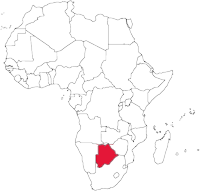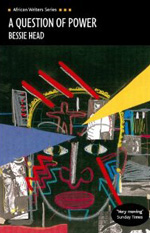
 This amazing novel was written by South African Bessie Head in 1974. Like the novel's protagonist, Elizabeth, Head was a
schoolteacher with a failed marriage who eventually made her home in Botswana. A Question of Power picks up Elizabeth's story
as she moves to Botswana and begins a four-year battle with undiagnosed schizophrenia.
This amazing novel was written by South African Bessie Head in 1974. Like the novel's protagonist, Elizabeth, Head was a
schoolteacher with a failed marriage who eventually made her home in Botswana. A Question of Power picks up Elizabeth's story
as she moves to Botswana and begins a four-year battle with undiagnosed schizophrenia.
After a psychosis-induced outburst, Elizabeth loses her teaching position in the village of Motabeng. Sensing Elizabeth's troubled mind, the local director of community projects offers her a lifeline. Villagers build a little house for Elizabeth and her young son, Shorty, and she is assigned work at the community vegetable garden. Botswana, at this time, is a hive of volunteer activity, with Europeans falling over themselves to help make Botswana self-sufficient. Local people are making clothing, handbags, necklaces, bricks and growing their own food: "Elizabeth sat down next to the plot and spread her notebook open on her knees. The air was alive with the tinkle of gently seeping water. Laid down in the centre of each bed were long lengths of perforated plastic pipes. Water tippled out of each like minute waterfalls, in a continuous stream. It was a garden that watered itself the whole day long."
Elizabeth is generally happy in the vegetable garden, but her nights are filled with frightening visions that eventually permeate every aspect of her life. A Question of Power is divided into two parts: "Sello" and "Dan". These are two people from the village who are transformed into hallucinated figures. At first Sello is a benevolent soul but he turns on Elizabeth and unleashes the monstrous Medusa who hurls lightning bolts at her: "It was like a black roaring scene of obscenity, on the high tide of which Medusa rose and stared down at her from an immense height. By day, Elizabeth crawled around painfully. By night she lay back, a pinned-down victim of approaching death." Dan is equally horrendous and, like Medusa, wants to end Elizabeth's life. Dan is all about sex, copulating with a different woman every night in Elizabeth's bed. None of the sex is graphic or gratuitous, but it does provide a colourful, crazy cast of women.
Part of the narrative thread is Elizabeth's ongoing attempt to understand goodness and evil: "She understood the basic teaching methods of goodness. They led the heart and mind on bit by bit; they appeared to resolve impossible conflicts. [Sello] was saying something else this time about the crying in the heart, that love-relationships are like eternal damnation—they unfold and fulfil themselves, and the deeply drawn links of soul to soul have to be discarded." Although most of this rationalisation takes place in a state of psychosis, it also carries over into Elizabeth's reality.
Of course there is also the question of power. In Elizabeth's crazed state she is the vulnerable one, at the mercy of Sello and Dan. The latter wants her to kill herself and her son. One wonders who will ultimately hold the power—Elizabeth or her illness? Head also raises the matter of racism in Africa and makes several references to the oppressors and the oppressed. Cleverly, Head takes this into Elizabeth's hallucinations and her suffering becomes a metaphor for the suffering of Africa, for the powerless, starving millions. On one occasion Elizabeth sees it herself: "A group of people walked quietly into the room. They were the poor of Africa. Each placed one bare foot on her bed, turning sideways so that she could see that their feet were cut and bleeding. They said nothing but an old woman out of the crowd turned to Elizabeth and said: 'Will you help us? We are a people who have suffered.' "
Elizabeth's struggle with schizophrenia is terrifying, and yet A Question of Power is not a depressing novel. In the
face of the horror, there is somehow a sense of hope. Head's prose is very good and she is a wonderful storyteller.
There were many passages that were so marvellous I had to read them more than once. As I said at the beginning of the
review: this book is amazing.

Longman, paperback, 9780435907204